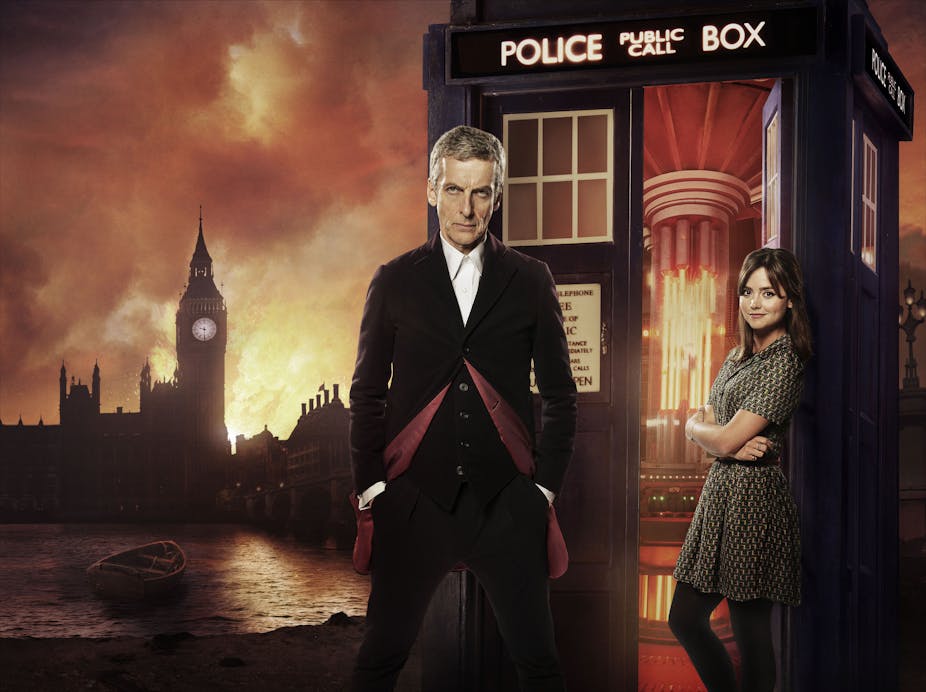The teaser trailers and articles that have been tantalising Doctor Who fans for months are now reaching a crescendo, with the first episode of the new series due to air on August 23. And they promise a new era. The new Doctor, Peter Capaldi, is already being promoted as offering a darker take on the role than his predecessor Matt Smith, and the production team have highlighted a slower pace of storytelling and less flirtatious relationship between the Doctor and his companion Clara (Jenna Coleman).
Although these changes will probably be a lot less noticeable than promotional material has suggested, recent trailers have certainly highlighted the bleaker aspects of the Doctor’s character. In a recent teaser, a Dalek voice is heard saying: “I see into your soul, Doctor … I see beauty, divinity, hatred!”
The choice of terms is interesting. Two are specifically religious concepts – the soul and divinity – which might initially appear out of place in a science fiction series. But this is far from the truth. Last year I was widely quoted as advocating that Doctor Who should be on the religious curriculum. These reports were a bit of an exaggeration, but I do think that popular culture should have a place in school religious syllabuses.
There may have been a decline in the numbers identifying themselves as religious over the past 50 years, but the interest in exploring religion through entertainment has by no means fallen. Scores of popular shows explicitly use religious themes as a basis for their narrative – look at Supernatural, True Blood, and Sleepy Hollow, to name just a few.
And in the past three months, more have debuted on US television. There’s Dominion, which is based on spiritual warfare and apocalyptic mythology, and HBO’s The Leftovers, which explores an event resembling the fundamentalist Christian concept of “the Rapture”. These shows might not represent “orthodox” positions, but they certainly highlight an interest in religious and supernatural themes. And so perhaps it’s unsurprising that religious language might be applied to the Doctor.
Popular entertainment can be a significant alternative source of information on religion. Catholic Bishop Paul Hendricks recently spoke about the way in which Doctor Who touches on important spiritual issues, such as the development of the self over time. And New Orleans pastor Matt Rawle showed his congregation episodes of the show and then led a Doctor Who-themed sermon series, dressed as Matt Smith’s Doctor. Similarly, Christians active in fandom create fan art and fiction which uses Doctor Who and similar shows as a way of exploring theological issues. This is not a case of popular culture promoting religion or replacing it. Instead, it is an example of fans using cultural material as a way of exploring important questions of faith.
When TV programmes raise questions of divinity and the soul they offer an opportunity for viewers to think about and discuss these issues. And whether you are Muslim, Christian, atheist or Jewish, a show such as Doctor Who will offer plenty of food for thought in between exploding Daleks and Cybermen. Of course, most of us are watching in order to be entertained, not as a way of entering philosophical debates. But just because a programme is billed as “entertainment”, doesn’t mean that it avoids touching on important issues.
In this way, popular culture can encourage discussion of important religious concerns. It can act not only as an gateway into philosophical and theological debates, but as a contributor to them.
So surely popular culture, including Doctor Who, should be actively engaged with in the teaching of religious education. This might conjure up images of teachers in long scarves and bow ties replacing discussions of reincarnation with regeneration cycles, but the suggestion is hardly so radical. An appreciation of popular culture should not mean that religious studies stops teaching important thinkers and theories in philosophy, theology, and ethics. It rather asks us to think about how contemporary culture affects religious practice; the way in which religion is lived and understood as part of everyday life.
Promoting understanding of the interaction between religion and popular culture allows us to see that religion isn’t a hermetically sealed set of ideas untouched by the contemporary world. Instead it is a dynamic and shifting force. Like Doctor Who, religion evolves, changes and regenerates in different cultural situations – and studying it is a real “adventure in time and space”.

